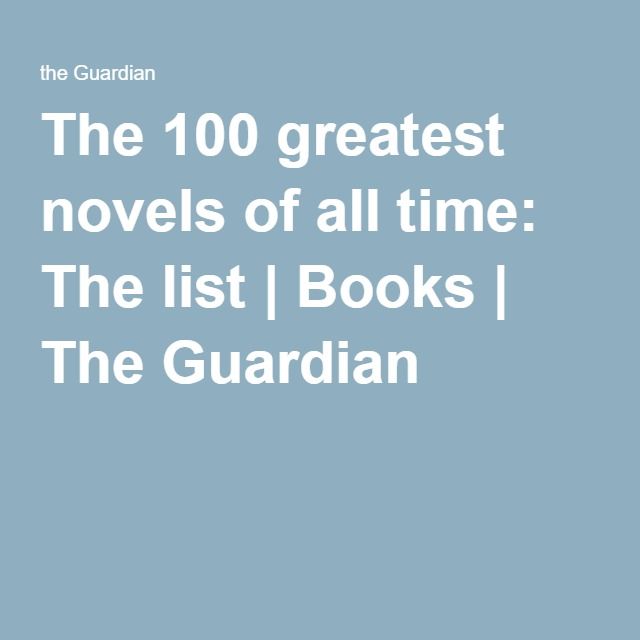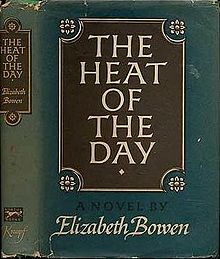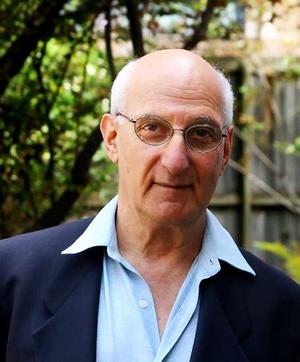We spent several hours, day and night, discussing Robert McCrum’s list of ‘The 100 best novels written in English’ from the ‘Guardian.’
Google will produce several associated lists but the one I mean is found at
https://www.theguardian.com/books/2015/aug/17/the-100-best-novels-written-in-english-the-full-list
The list is the product of two years of ‘careful consideration.’ The introduction refers to the list as the ‘greatest’ novels.

The work must be a novel and written in English. When we went through the list we also supposed there was an additional element, every author only has one novel listed. They are listed in chronological order.
Yes, one can quibble over the definition of a novel, or even perhaps written in English (see the impenetrables below); entertaining perhaps, but hardly productive. And then there is that word ‘great’ constrained by the number one hundred. What does make a novel great? On there a few words at the end.
We read the list and discussed what we knew about each writer, or took note of writers that were unknown to us, consulting Professor Wikipedia at times for more information.
The list begins with ‘The Pilgrim’s Progress’ (1678) – a ‘story of a man in search of truth told with clarity and beauty,’ says McCrum. Much as we like Geoffrey Chaucer’s ‘The Canterbury Tales’ (1386), a novel they are not.
Robinson Crusoe, Lemuel Gulliver, Tristram Shandy, Tom Jones, Clarissa, Emma, and Dr Frankenstein get their dues.
The first krimi is Wilkie Collins’s ‘The Moonstone’ (1868). Though Edgar Allan Poe is there with his one spooky novel, along with Arthur Conan Doyle, Dashiell Hammett and Raymond Chandler follow, but not the uncrowned king of noir, Ross Macdonald. Tsk. Tsk.
We loved the description of George Elliot’s ‘Middlemarch’ (1872) as ‘a cathedral of words.’
Benjamin Disraeli is there, before he became British prime minister, but also Jerome K. Jerome. Who?
There were others that struck no bell with me:
George Gissing, ‘New Grub Street’ (1891)
Fredrick Rolfe,’ Hadrian the Seventh’ (1904)
Max Beerbohm, ‘Zuleika Dobson’ (1911)
Sylvia Warner, ‘Lolly Willowes’ (1926)
Henry Green, ‘Party Going’ (1939)
Elizabeth Bowen, ‘The Heat of the Day’ (1948)
Elizabeth Taylor, ‘Mrs Palfrey at the Claremont’ (1971)
Marilynne Robinson, ‘Housekeeping’ (1981)
Penelope Fitzgerald, ‘The Beginning of Spring’ (1988)

Joseph Conrad’s ‘The Heart of Darkness’ (1899) made the cut. But is it a novel or a long short story? Quibble. Quibble. The trouble with quibbles.
Also on the list is the impenetrable prose of Theodore Dreiser of whom is it is said ‘he was no stylist.’ Indeed. Speaking of the impenetrable, there is Ford Maddox Ford, ‘The Good Soldier’ (1915) and James Joyce, ‘Ulysses’ (1922).
While there were many famous titles, I was not sure all were great novels. There was John Buchan’s ‘The Thirty-Nine Steps’ (1915) which is a rattling good story, but is it a great novel? It may be the cornerstone of the espionage genre that followed, but is that enough to merit inclusion when Agatha Christie is omitted?
It will take a lot more than assertion to convince me that Ernest Hemingway wrote a great novel. The title is ‘The Sun Also Rises’ (1926). Oh hum. I also wondered about John Dos Pasos, ‘Nineteen-Nineteen’ (1932) and ‘At Swim-Two-Birds’ (1939) by Flan O’Connor and — most of all — H. G. Wells with ‘The History of Mr Polly’ (1910). For Wells I might have swallowed one of science fiction titles like ‘The Time Machine,’ ‘The Invisible Man,’ or ‘The War of the Worlds’ but not this trite and self-indulgent disguised autobiography.
While the demigod William Faulkner is there, the novel cited is not his most astounding. ‘As I Lay Dying’ is the one, but his most hypnotic novel is ‘Absalom! Absalom!’ (1936). The novel he thought was his best was ‘The Sound and the Fury’ (1929). By ‘best’ Faulkner meant the most painfully true.
One book authors are here like Harper Lee.
Carson McCullers who is in another, higher league than Harper Lee is not, nor is William Styron.
Two towering English writers are also conspicuous by their absence: Barbara Pym, ‘Excellent Women’ (1952) and Antony Powell, ‘A Dance to the Music of Time’ (1951-1975). Also absent is John Galsworthy, ‘The Forsyth Saga.’

The list ends with a number of contemporary writers, most of whom leave me cold, e,g., Martin Amis, John McGarhan, Don DeLillo, and Peter Carey. More oh hum from me.
In addition to the expatriate Peter Carey, Australia is represented on the list by the egregious Patrick White. Absent is the luminous David Malouf; when will the Nobel Committee wise up?
 David Malouf
David Malouf
There is a Canadian writer, or two, but not the profound Gabrielle Roy, a bank clerk by day and a communicate with eternity by night. To this day she is listed on the Amazon Canada web site as Roy Gabrielle, despite many corrections offered by we readers!
Whoops, Roy did not write in English.
Nor does Willa Cather make the list, and the list is poorer for it.
 Robert McCrum
Robert McCrum
Coda
The pleasure of an exercise like this is that it makes one stop and think, first about the old friends on the list, also about the titles and authors one knows of but has not read. It also introduces new authors and other titles for the reader. Each is welcome.
But most of all it makes one think about the criterion: great.
Is a great novel one that influences other writers?
One that wins readers across generations and cultures?
Is it one that creates an enduring world with its words?
Is it one that leaves an indelible impression of the mind of a reader?
A great novel is one that does such things because there are many, even several, ways to be great.
Skip to content
